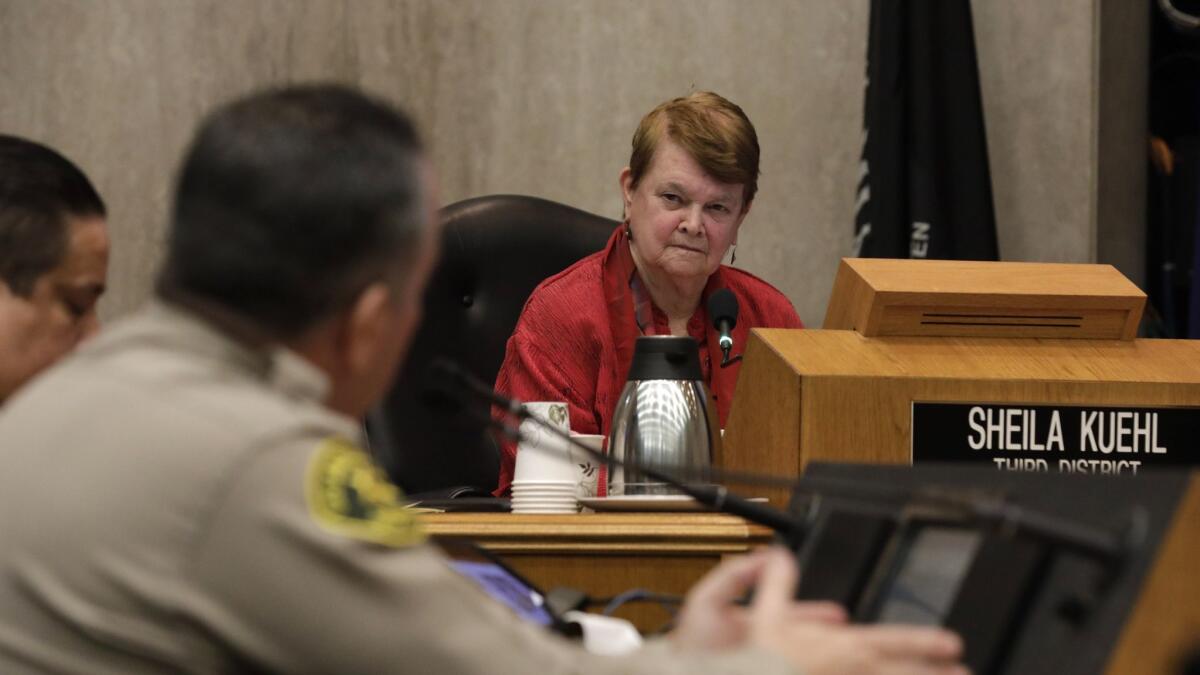L.A. County voters to decide whether to divert millions to social services and racial justice

- Share via
The Los Angeles County Board of Supervisors passed a measure Tuesday to let voters decide whether to boost spending on social services, in an initiative dubbed “Re-Imagine L.A. County” that has drawn strong opposition from labor unions and Sheriff Alex Villaneuva, who called it a veiled attempt to reduce funding for law enforcement.
The measure, slated for the November election, would amend the county’s charter, requiring that 10% of locally generated, unrestricted county money — about $400 million — be spent on housing, mental health programs, jail diversion, employment opportunities and social services. The county would be prohibited from using the money on prisons, jails or law enforcement agencies.
“For far too long our locally generated tax dollars have been given to reinforce the legal injustice system that has failed to make our communities safer, torn apart our families and caused generational trauma,” said Eunisses Hernandez, a Re-Imagine L.A. County coalition co-chair.
To many in the coalition of almost 100 organizations — among them, Black Lives Matter Los Angeles and the United Way of Greater L.A. — the proposal is a continuation of the board’s recent reform initiatives, which include continued efforts to create alternatives to jail and prison and last month’s passage of an antiracist policy framework pushed by Supervisor Mark Ridley-Thomas.
Ridley-Thomas said after Tuesday’s 4-1 vote that an antiracist approach to governance should focus spending on rehabilitation and restoring communities over a punitive criminal justice system.
“This re-imagining must fundamentally and meaningfully prioritize investments in community health and well-being — and we can’t allow perfection to be the enemy of good,” Ridley-Thomas said.
Supervisor Kathryn Barger, whose 5th District is the largest geographically and spans about 2,800 miles in northern L.A. County, has been the only supervisor opposed to the charter amendment.
At Tuesday’s meeting, Barger, the only Republican on the board, said she feared the measure hadn’t been appropriately vetted by stakeholders, including labor unions, some of whom have opposed the initiative for fear it will lead to a cut in county jobs.
Barger said she wasn’t opposed to making significant investments in communities but was critical of how quickly the Re-Imagine L.A. County initiative made it to the ballot, arguing that “this process was anything but transparent.”
“This amendment will tie the hands of future boards, preventing them from acting nimbly to meet the public’s needs in real time,” Barger said.
Supervisor Sheila Kuehl, who authored the measure, disagreed, saying the board would still retain flexibility in funding.
“This doesn’t tie our hands in a way,” Kuehl said. “It simply says, ‘We’d like you to allocate this money in ways that help communities.’ And I don’t think that’s really a bad thing. It doesn’t take anything away from our priorities. It actually exhibits our priorities.”
The amount of unrestricted locally generated money in the county’s budget varies from year to year.
If the amendment were in effect now, between $360 million and $496 million could potentially go toward purposes specified in the charter amendment, according to the county’s chief executive office.
If approved, the county would begin phasing in the measure next July, implementing it fully by June 30, 2024. If the county were ever in a financial emergency, the board could, through a four-fifths vote, reduce how much money it would allocate under the measure.
Villanueva called the title of the proposal deceptive, saying it is a veiled attempt to slash the Sheriff’s Department’s budget. A 10% cut to the department would result in the loss of 1,020 jobs, he said, while also questioning the constitutionality of the idea.
“You’re gonna have your own challenges with the constitutionality of this — the fact that there was no meet and confer, and the massive impact this is gonna have on certified bargaining units that you have to represent,” he told the board last week.
The Sheriff’s Department has been clashing with the supervisors for months over budget cuts triggered by the pandemic-induced economic slowdown.
In the latest flare-up in his feud with county officials, Sheriff Alex Villanueva refers to Supervisor Hilda Solis as “La Malinche,” a name historically used in Mexico to demean a woman as a traitor or sellout.
In May, Villanueva announced plans to close two patrol stations — Altadena and Marina del Rey — to help shrink his department’s budget deficit. He quickly scrapped that proposal after swift backlash from those communities.
Kuehl said in an interview that Villanueva intentionally chose budget cuts that the supervisors would not want as part of a larger narrative the sheriff has been pushing to incite fear among constituents by implying that the board’s actions — including the Re-Imagine L.A. County initiative — will lead to fewer deputies to combat crime.
“It was a sort of, I would say, a middle-finger kind of proposal to us,” Kuehl said. “And so the CEO said, ‘Well, why don’t we just look at [the number of] your custody officers?’ and that was a non-starter with him, even though that would be most appropriate.”
Ultimately, the board cut $162 million from the Sheriff’s Department budget, which county officials said could result in 451 potential layoffs, records show.
The measure has also faced strong opposition from unions representing 80,000 L.A. County employees.
In a memo sent to the Board of Supervisors in late July, the Coalition of County Unions and SEIU Local 721 objected to the measure, arguing it was “clearly unlawful” because, they said, the Board of Supervisors’ ordinance requires the county to negotiate with its labor unions before going to voters to amend the county charter.
At Tuesday’s meeting, Supervisor Hilda Solis, who co-authored the measure with Kuehl, said she disagreed with the rhetoric implying that the measure would hurt county workers.
“What’s so frightening about putting this in front of the voters and having them decide?” Solis asked. “In my opinion, it is not as threatening as some folks that have sent correspondence [to the board] tried to make this out as. I don’t think any one of us here wants to eliminate positions outright. I don’t think that’s what this is about.”
More to Read
Sign up for Essential California
The most important California stories and recommendations in your inbox every morning.
You may occasionally receive promotional content from the Los Angeles Times.












